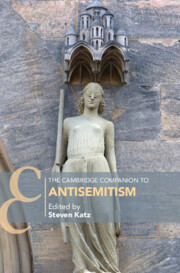Refine search
Actions for selected content:
2 results
10 - Antisemitism in Interwar Europe
-
-
- Book:
- The Cambridge History of the Holocaust
- Published online:
- 16 May 2025
- Print publication:
- 12 June 2025, pp 198-219
-
- Chapter
- Export citation

The Cambridge Companion to Antisemitism
-
- Published online:
- 05 May 2022
- Print publication:
- 02 June 2022
